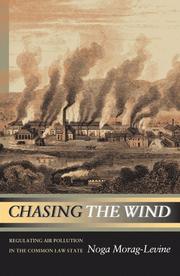| Listing 1 - 1 of 1 |
Sort by
|

ISBN: 0691123810 0691094810 9786612129438 9786612935350 1282935356 1282129430 1400825857 9781400825851 9780691123813 9780691094816 9781282129436 9781282935358 6612935359 6612129433 9780691123813 Year: 2009 Publisher: Princeton, NJ
Abstract | Keywords | Export | Availability | Bookmark
 Loading...
Loading...Choose an application
- Reference Manager
- EndNote
- RefWorks (Direct export to RefWorks)
The Federal Clean Air Act of 1970 is widely seen as a revolutionary legal response to the failures of the earlier common law regime, which had governed air pollution in the United States for more than a century. Noga Morag-Levine challenges this view, highlighting striking continuities between the assumptions governing current air pollution regulation in the United States and the principles that had guided the earlier nuisance regime. Most importantly, this continuity is evident in the centrality of risk-based standards within contemporary American air pollution regulatory policy. Under the European approach, by contrast, the feasibility-based technology standard is the regulatory instrument of choice. Through historical analysis of the evolution of Anglo-American air pollution law and contemporary case studies of localized pollution disputes, Chasing the Wind argues for an overhaul in U.S. air pollution policy. This reform, following the European model, would forgo the unrealizable promise of complete, perfectly tailored protection--a hallmark of both nuisance law and the Clean Air Act--in favor of incremental, across-the-board pollution reductions. The author argues that prevailing critiques of technology standards as inefficient and undemocratic instruments of "command and control" fit with a longstanding pattern of American suspicion of civil law modeled interventions. This distrust, she concludes, has impeded the development of environmental regulation that would be less adversarial in process and more equitable in outcome.
Air --- Pollution --- Law and legislation --- Air - Pollution - Law and legislation - United States
| Listing 1 - 1 of 1 |
Sort by
|

 Search
Search Feedback
Feedback About UniCat
About UniCat  Help
Help News
News